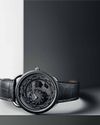Mention the word ‘nuclear’ and most of us immediately think of a mushroom-shaped cloud. But this form of energy could be our best bet to saving ourselves.

Regardless of race, nationality, gender or faith, one thing has often bound us together as the human race: our fascination with the heavens. Books, television shows and films romanticize traveling through our solar system and the galaxy to explore and discover. Some of us may spend our free time stargazing, while others work to become the next class of astronauts.
Curiosity and discovery run through our veins and space is the next frontier.
Since the Moon landing, the US and others have dreamed of becoming an interplanetary species by landing on Mars. But what would this take? And can we do it?
Travel to Mars currently is projected between six and 12 months each way, meaning up to two years of traveling alone to reach the Red Planet. This is not just a problem for cargo and communication—it is a problem for the astronauts’ health.
Exposure to radiation for as long as a year causes damage to the human body. American astronaut Scott Kelly spent a year in space on the International Space Station. While researchers found that most of the damage Kelly incurred from space was reversed upon his return to Earth, they are not sure astronauts will be so lucky on trips to Mars.
The potential to not only curb radiation exposure for the crew, but also achieve what will be humanity’s greatest accomplishment of the millennium, depends on what propulsion system is chosen to travel to Mars.
The most common form of space propulsion is chemical. In fact, it is the only form of propulsion that is capable of lifting off the Earth’s surface. Used both for human and scientific missions, chemical propulsion is the oldest method of space travel.
Once off the Earth’s surface and in space, the choices are much less limited. Both crewed and scientific missions can continue with chemical propulsion or they can switch to electric, thermal or a hybrid option.
Diese Geschichte stammt aus der June/July 2019-Ausgabe von Esquire Singapore.
Starten Sie Ihre 7-tägige kostenlose Testversion von Magzter GOLD, um auf Tausende kuratierte Premium-Storys sowie über 8.000 Zeitschriften und Zeitungen zuzugreifen.
Bereits Abonnent ? Anmelden
Diese Geschichte stammt aus der June/July 2019-Ausgabe von Esquire Singapore.
Starten Sie Ihre 7-tägige kostenlose Testversion von Magzter GOLD, um auf Tausende kuratierte Premium-Storys sowie über 8.000 Zeitschriften und Zeitungen zuzugreifen.
Bereits Abonnent? Anmelden

THE MILD HANGOVER
Hangovers get a bad rap. We know. If you’ve gotten this far in the magazine, you’ve surely divined that we’re mildly hungover most of the time.

AN ELECTRIC FUTURE
Polestar, the minimalist electric Swedish car brand, turns the voltage up on its competition.

LET'S GET REAL (ESTATE): LUXURIOUS LONDON
Royalty, shopping, the best tea and scones the world has to offer, and a lifestyle worthy of what you're working for. Here's why London is ripe for your next investment

NEXT UP....ZARAN VACHHA
As Co-founder of the events and talent agency Collective Minds and Managing Director of the Mandala Masters, Zaran Vachha is definitely not new to the culture scene, but he's certainly shaping what comes next.

WHAT I'VE LEARNED...
I DON’T WEAR SOCKS except in January.

The Body Is a Language
A bad handshake is such a turnoff; we feel irked when someone rolls their eyes at us; we can't stop pacing when we're nervous-ever wondered how certain body language has the power to change how we feel instantly? We explore why.

EYE OF THE TIGER
Hailing from Singapore, Japan and Brazil respectively, Evolve Mixed Martial Arts (MMA) athletes Darren Goh, Hiroki Akimoto and Alex Silva are proof that the ring demands as much from mind as it does from matter.

THE ADONIS COMPLEX
With the rise of superhero culture making a return and bringing with it the celebration of the classically ‘masculine’ body type, can men really overcome the pressure to conform when culture keeps getting in the way?

FUNNY BUT TRUE
A comedian, an iconic Singaporean, and now a man much evolved. After overcoming two years of pandemic limbo, unlocking career milestones one after another and undergoing a life-defining physical transformation, Rishi Budhrani is ready to emerge into the world renewed-and anew.

LIKE NO OTHER
With its horological triumphs, Hermès has truly come into its own as a watchmaking maison. In this exclusive interview with Esquire Singapore, CEO of Hermès Horloger, Laurent Dordet sheds some light on his timepieces' rising stardom and the importance of being different.